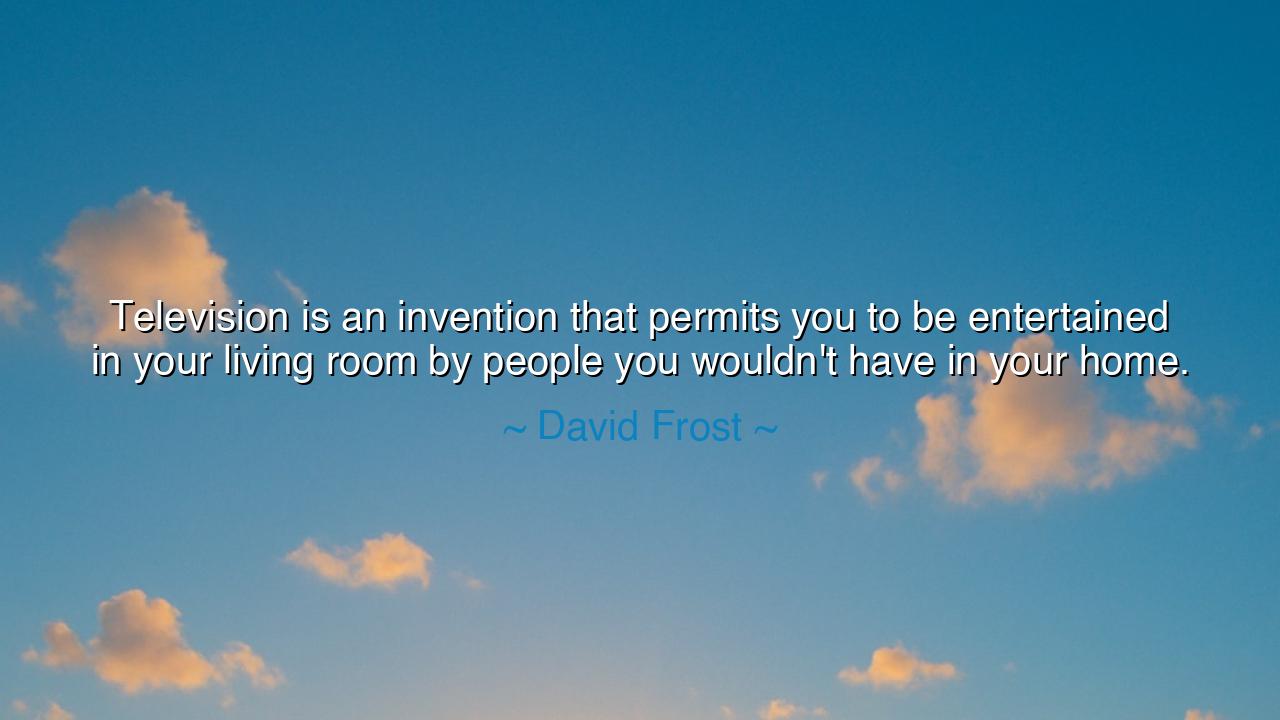
Television is an invention that permits you to be entertained in
Television is an invention that permits you to be entertained in your living room by people you wouldn't have in your home.






In the sharp and timeless wit of David Frost, the great broadcaster and chronicler of human folly, we encounter a truth as piercing as it is humorous: “Television is an invention that permits you to be entertained in your living room by people you wouldn’t have in your home.” Though spoken with laughter, this saying bears the weight of a philosopher’s insight. For Frost, with his eye on both the absurd and the profound, revealed how technology—once hailed as the liberator of mankind—can also become the veil that separates us from the real and the true. Beneath his jest lies a mirror reflecting modern civilization: a people who welcome strangers, vices, and vanities into their sacred spaces, not through their doors, but through the flickering light of a screen.
To understand his words, one must first understand David Frost, a man who stood at the crossroads of intellect and entertainment. Born in England in 1939, he rose to prominence during the golden age of television. His interviews cut to the soul of politics, art, and scandal; his charm masked a razor of perception. He had seen firsthand how the medium that could educate, uplift, and unite could also corrupt, seduce, and trivialize. Thus, when he spoke of television bringing into one’s living room those “you wouldn’t have in your home,” he was not only joking about unsavory personalities—he was warning of a deeper transformation: that the screen had become a new altar, before which humanity kneels daily, surrendering its discernment in exchange for distraction.
Television, that glowing oracle of the twentieth century, had promised to bring the world together. It carried kings and comedians alike into the same households, dissolving barriers of class and distance. Yet, as Frost saw, this power was double-edged. It gave voice to truth but also to vanity; it broadcast wisdom but amplified ignorance. The living room, once a place of family gathering and intimate conversation, became a stage for the world’s theater—filled not with the warmth of friends, but the illusions of strangers. In his cleverness, Frost reminds us that technology may extend the reach of our senses, but it can just as easily shrink the boundaries of our soul.
Throughout history, every great invention has carried this duality. When Prometheus stole fire from the gods, it was both a gift and a curse. Fire could warm the hearth or burn the city. Likewise, television, and by extension all modern media, can enlighten or corrupt. Consider the early days of the broadcast age, when the world watched as men first walked upon the moon. It was a moment of collective awe—a testament to what humanity could achieve together. Yet, in that same age, television also gave rise to propaganda, to celebrity idolatry, and to the endless noise that drowned reflection. It brought the wise and the foolish to equal volume, until the difference between virtue and spectacle blurred into the static of convenience.
Frost’s quote endures because it touches a universal tension—the longing for connection against the comfort of isolation. In the ancient world, a man’s home was his sanctuary, guarded by firelight and silence. To welcome another was to share one’s soul. But now, through the glowing window of technology, we invite the world in without question. The strangers who enter our homes through the screen—whether they are politicians, performers, or provocateurs—bring with them not only entertainment but influence. They shape our thoughts, our desires, even our fears. Frost’s humor thus conceals a warning: guard your home, not only from thieves at the door, but from voices that creep through the airwaves.
Yet his words are not a condemnation of invention; they are a call to wisdom. Television, like every human creation, is neither saint nor demon—it is a mirror, reflecting the spirit of its age. If it shows us folly, it is because folly amuses us. If it glorifies vanity, it is because vanity sells. The true danger lies not in the device, but in the viewer who forgets to choose, who forgets to question, who forgets to turn it off. Frost, the master interviewer, knew that truth begins not with speech, but with listening and discernment. He invites us to reclaim that power—to watch, but not to worship; to learn, but not to be led.
So, my children of the digital age, remember the wisdom hidden in Frost’s jest. Be mindful of what you welcome into your home, and more so into your mind. Let your living room not be ruled by strangers, but by conversation, laughter, and the quiet presence of those you love. Technology should serve humanity, not consume it. Sit before the screen, if you must, but never forget that the greatest stories are those lived, not merely viewed. For in the end, Frost’s laughter is the laughter of the wise—the laughter that warns as it delights, reminding us that while invention may bring the world to our doorstep, only the heart can decide who is truly welcome inside.






AAdministratorAdministrator
Welcome, honored guests. Please leave a comment, we will respond soon